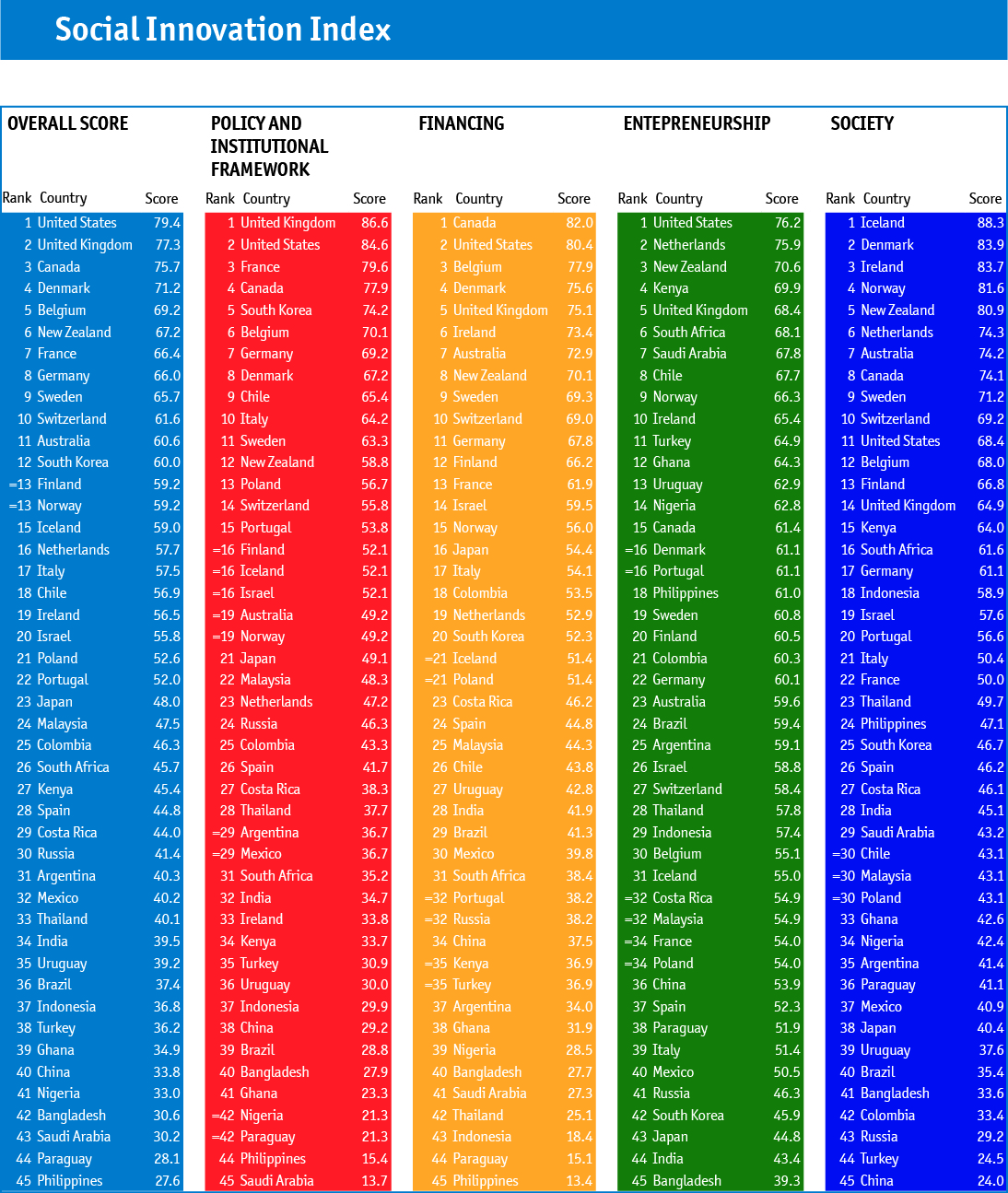- 高所得国、特にOECD加盟国がソーシャルイノベーション創出環境ランキングの上位を占める
- データの透明性はソーシャルイノベーション創出に必要不可欠だが、オープンデータ化が充分に進む国はごくわずか
- 社会的企業向けの法的枠組みを備える国は依然として例外的存在
エコノミスト・インテリジェンス・ユニット(EIU)が29日付でリリースした調査レポートによると、ソーシャル・イノベーションの創出環境に秀でたトップ10カ国はアメリカ(1位)、カナダ(3位)、ニュージーランド(6位)を除きすべてヨーロッパの先進経済国だった。対象となった45カ国のうち、日本は23位とアジアのトップパフォーマーである隣国の韓国(12位)や他、先進国にも遅れをとっている。サウジアラビア、パラグアイ、フィリピンが各々、43位、44位、45位を占める。
日本財団協賛の下に作成されたソーシャル・イノベーション・インデックス2016は世界45カ国においてソーシャル・イノベーション創出に適した環境がどのようなものなのかに光を当てたものだ。各国において、ソーシャル・イノベーションの更なる活躍には未だ様々な取り組みが必要とされていることがわかった。
同指数でトップを占めるのはいずれも、国民1 人当たりの所得水準や人間開発指数、安定した民主主義体制といった項目で高いスコアを獲得している。ソーシャル・イノベーションに対する政策的・組織的支援という指標に、本指数で大きなウェイトが与えられていることを考えれば、上位国が似たような特徴を備えていることは当然とも言えよう。
多くの専門家は、データの透明性に関する政策を、ソーシャル・イノベーションの根幹をなす存在と捉えている。特に地域レベルで社会福祉サービスを提供する場合は、こうした政策が不可欠だ。政府による関連データの収集・公開、ソーシャル・イノベーションの影響とニーズ関するリサーチの有無を評価する指標で、トップスコアを獲得した国はわずか9カ国にとどまった(ベルギー・チリ・デンマーク・フランス・ドイツ・ポーランド・スウェーデン・英国・米国)。
ソーシャル・イノベーションを推進するために最も重要な要素の1つは、社会的企業に対する法的枠組みの存在だ。社会的企業の存在を明言化することで、社会起業活動の活性化や経営役員の法的保護、政策支援の推進が期待されるからだ。だが現在のところ、こうした枠組みが見られる国は例外的存在で、調査対象となった45カ国中わずか7カ国にとどまっている。
編集責任者の近藤奈香は次のように述べる:
「世界各国の政策担当者や非政府組織[NGO]、慈善団体、起業家は、貧困やホームレス、環境問題といった様々な社会課題への対応策として“ソーシャル・イノベーション”に熱い視線を注いでいる。 その中で政府にはソーシャル・イノベーション創出に適した環境作りが期待されている。ここで求められているのは必ずしも資金援助ではなく、データ公開や意思決定過程の共有といった不確実性の可能な限りの排除-「透明性の確保」だと考える。」
白書全文へアクセスするにはこちらをクリックしてください。
メディア問い合わせ:
近藤奈香, エディター
The Economist Intelligence Unit
+81 (3) 5223 2166
東京
編集者の皆様へ:
ソーシャル・イノベーション・インデックス2016について
ソーシャル・イノベーション・インデックス2016は、世界の先進国・新興国45カ国を対象とし、ソーシャル・イノベーション創出環境を評価するために政治・ビジネス環境を評価した指数である。同指数は、政治的・制度的フレームワーク、資金調達環境、起業活動、社会という4つの項目で構成されている。詳細は白書「付録3」をご参照頂きたい。
対象45カ国リストは以下の通り(地域ごと):
南北米: アルゼンチン、ブラジル、カナダ、チリ、コロンビア、コスタリカ、メキシコ、パラグアイ、北米、ウルグアイ
アジア太平洋地域: オーストラリア、バングラデッシュ、中国、インド、インドネシア、日本、マレーシア、ニュージーランド、フィリピン、韓国、タイ
欧州: ベルギー、デンマーク、フィンランド、フランス、ドイツ、アイスランド、アイルランド、イタリア、オランダ、ノルウェイ、ポーランド、ポルトガル、ロシア、スペイン、スウェーデン、スイス、トルコ、英国
中東・アフリカ: ガーナ、イスラエル、ケニア、ナイジェリア、サウジアラビア、南アフリカ

エコノミスト・インテリジェンス・ユニット(EIU)について
エコノミスト・インテリジェンス・ユニットは英国の国際政治経済誌「The Economist」の企業間(BtoB)事業部門であり、世界のマーケット動向やビジネス戦略についてのタイムリーで信頼度の高い、かつ公平な分析をエグゼクティブの方々に提供しています。詳細はwww.eiu.com または www.twitter.com/theeiu をご覧ください。
日本財団について
日本財団は、ボートレース事業からの拠出金をもとに、海洋・船舶に関する問題の解決、福祉や教育の向上、人道援助や人材育成を通じた国際貢献など、人々のよりよい暮らしを支える活動を推進している。公式ホームページ:http://www.nippon-foundation.or.jp/
Japan ranks 23rd in index measuring capacity for social innovation, US tops the index
- High-income countries, particularly OECD members, top the Social Innovation Index
- Data transparency is crucial in promoting social innovation, but few countries are open enough
- Legal frameworks for social enterprises are still rare
A new report released today (September 29th) by The Economist Intelligence Unit (EIU) finds the top ten countries with the most capacity for social innovation are mainly rich Western nations: aside from the US (1st), Canada (3rd) and New Zealand (6th), all others are wealthy European nations. Of the 45 countries in the Index, Japan (23rd) is a long way behind South Korea (12th) - a stand-out performer in the Asia Pacific region - and other similarly developed nations. Saudi Arabia, Paraguay and the Philippines occupy the bottom three positions in the index.
The Social Innovation Index 2016, sponsored by Nippon Foundation, is a ranking of 45 countries in the environment that enables social innovation. The index is a first-of-its kind in content and scale and sheds light on some of the common characteristics of social innovation seen around the world. It finds that much work remains to be done to enable social innovation efforts to flourish.
Top ranking countries in the Index tend to have high per-capita income and human development indicators as well as stable democratic governance, and institutional and policy support for social innovation were given a relatively heavy weighting in the Index.
Many experts see policies around data transparency as one of the main building blocks for social innovation, particularly in the delivery of social services at the community level. The EIU awarded only nine countries the top score in the indicator that measures whether governments collect and publish relevant data and research the impact of and need for social innovation.
Legal frameworks that underpin social innovation are complex but one of the most important aspects is whether a country has a legal framework for social enterprises. To date only seven countries in the Index have such frameworks in place. Legal protection and regulation is necessary to bring social enterprises to the attention of policymakers and the public, clearing ambiguities around their status, which can sometimes have financial consequences.
Naka Kondo, editor of the report, said:
“Policymakers, non-government organisations, charities and entrepreneurs across the world are showing increasing interest in ‘social innovation’ as a means of addressing various problems from poverty and homelessness to environmental degradation. For social innovation to really gain traction there must be data proving its impact and this data must be freely available. This would help secure further support from governments, businesses, donors and investors. At the moment efforts to collect such data are lacking in most countries.”
View the index and download the whitepaper
Press enquiries:
Naka Kondo, Editor
+81 (3) 5223 2166
Tokyo
Notes to editors
About the Social Innovation Index 2016
The EIU build the Social Innovation Index 2016 to assess the capacity of 45 countries to enable social innovation. The Index includes seven quantitative data points and 10 qualitative scores by EIU analysts, grouped into four pillars: policy and institutional framework, financing, entrepreneurship and depth of civil society. A full explanation of the methodology is contained in Appendix 3 of the whitepaper.
The 45 countries covered in the Index are (listed by region):
Americas: Argentina, Brazil, Canada, Chile, Colombia, Costa Rica, Mexico, Paraguay, United States, Uruguay
Asia-Pacific: Australia, Bangladesh, China, India, Indonesia, Japan, Malaysia, New Zealand, Philippines, South Korea, Thailand
Europe: Belgium, Denmark, Finland, France, Germany, Iceland, Ireland, Italy, Netherlands, Norway, Poland, Portugal, Russia, Spain, Sweden, Switzerland, Turkey, United Kingdom
Middle East and Africa: Ghana, Israel, Kenya, Nigeria, Saudi Arabia, South Africa

About the Economist Intelligence Unit
The Economist Intelligence Unit is the world leader in global business intelligence. It is the business-to-business arm of The Economist Group, which publishes The Economist newspaper. The Economist Intelligence Unit helps executives make better decisions by providing timely, reliable and impartial analysis on worldwide market trends and business strategies. More information can be found at www.eiu.com or www.twitter.com/theeiu.
About Nippon Foundation
The Nippon Foundation was established in 1962 as a non-profit philanthropic organization, active in Japan and around the world. Initially our efforts focused largely on the maritime and shipping fields, but since then the range of our activities has expanded to education, social welfare, public health, and other fields—carried out in more than 100 countries to date. Together with our more than 20 partner organizations in Japan and worldwide we are funding and assisting community-led efforts aimed at realizing a more peaceful and prosperous global society. More information can be found at http://www.nippon-foundation.or.jp/en/



